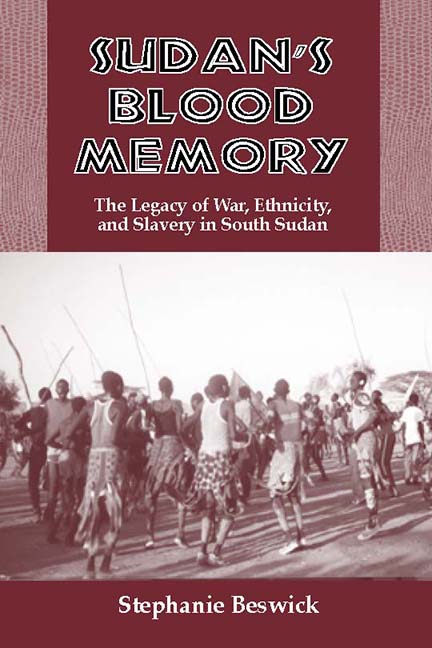Book contents
- Frontmatter
- Dedication
- Contents
- Maps
- Preface
- Acknowledgments
- A Note on Orthography and Languages
- A Note on Sources
- Map
- 1 Introduction
- 2 Geography and Brief History of Sudan
- 3 The Changing Nilotic Frontier
- The Ethno-Historical Formation of Southern Sudan
- 4 Slave Raids, Wars, and Migrations
- 5 Communities of the Sobat/Nile Confluence: The Padang
- 6 Communities on the Eastern Nile: The Bor
- 7 Communities in the Southwest: The Southern Bahr el-Ghazal
- 8 Communities in the Northwest: The Northern Bahr el-Ghazal
- The Ascendancy of the Dinka in Southern Sudan
- Foreign Intrusion and Its Consequences
- Notes
- Glossary
- Bibliography
- Index
4 - Slave Raids, Wars, and Migrations
from The Ethno-Historical Formation of Southern Sudan
Published online by Cambridge University Press: 23 July 2019
- Frontmatter
- Dedication
- Contents
- Maps
- Preface
- Acknowledgments
- A Note on Orthography and Languages
- A Note on Sources
- Map
- 1 Introduction
- 2 Geography and Brief History of Sudan
- 3 The Changing Nilotic Frontier
- The Ethno-Historical Formation of Southern Sudan
- 4 Slave Raids, Wars, and Migrations
- 5 Communities of the Sobat/Nile Confluence: The Padang
- 6 Communities on the Eastern Nile: The Bor
- 7 Communities in the Southwest: The Southern Bahr el-Ghazal
- 8 Communities in the Northwest: The Northern Bahr el-Ghazal
- The Ascendancy of the Dinka in Southern Sudan
- Foreign Intrusion and Its Consequences
- Notes
- Glossary
- Bibliography
- Index
Summary
“The Dinka and the Nubians have a connection; we are all brothers. They were our neighbors and we left them behind.”
Bor-Gok Dinka Michael Alier AgouThe ancient homeland of the Nilotic Dinka was the central Sudan and by all accounts they were the last Nilotic people to leave the region. As the forefathers of the Dinka moved south and southwest with their cattle they became embroiled in a series of major wars with other Southern Sudanese. Some of these conflicts were so bitter they lasted into modern times.
Why the Forefathers of the Dinka Migrated South
Dinka oral histories suggest that their early forefathers left central Sudan many centuries ago because of military stress, slave raids, and droughts. Thus, their forefathers fled southwards from their original homelands in the central Sudan. For example, according to Ciec Dinka Gordon Matot Tut: “We moved from Khartoum south via the Blue Nile towards Ethiopia, while others followed the White Nile mostly because of desertification but also because of wars.” Historical events depicted in a number of scholarly accounts of the thirteenth-century Gezira support these historical accounts. In the tenth century, the main town of the far southern Nubian kingdom of Alwa, Soba, located near the Nile confluence, was the most important in the Sudanese region south of the Christian kingdom of Dongola. It included some of the richest grazing lands and was heavily infiltrated by nomadic peoples who migrated south between the eleventh and fifteenth centuries. The catastrophic decline of this kingdom after 1208 was followed by an increase in slavery and slave raids. Further, the cordial relationship existing after 1250 between the southern Nubian kings of Alwan successor states and the Mamluk sultans of Egypt was motivated by a strong commercial interest in slaves.
Early evidence of contempt and negative Muslim attitudes towards non-Islamic peoples of the southern and central Gezira is illuminated by the fourteenth-century geographer, Abi Talib as-Sufi Ad-Dimishqi: “Beyond the Alwa country there is a land inhabited by a race of Sudan who go naked like the Zanj and who are like animals because of their stupidity; they profess no religion.”
- Type
- Chapter
- Information
- Sudan's Blood Memory , pp. 29 - 42Publisher: Boydell & BrewerPrint publication year: 2004



